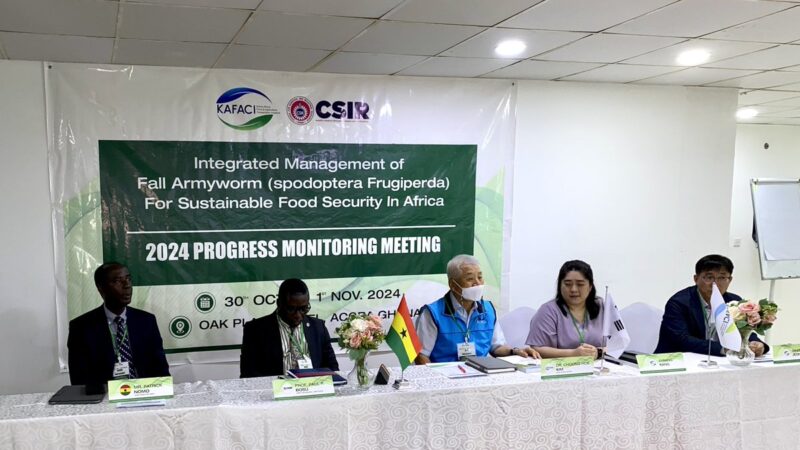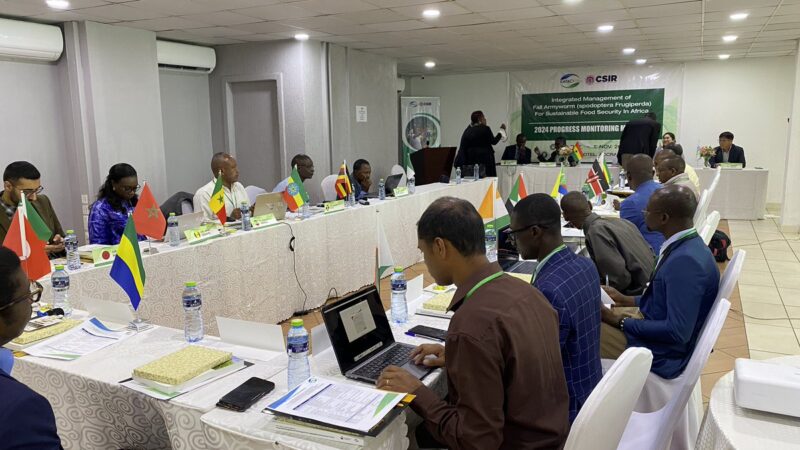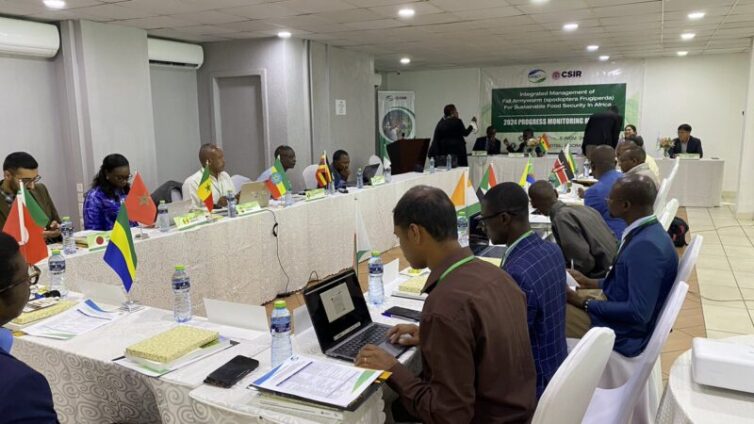Ghana is at the forefront of a significant initiative to tackle the invasive fall armyworm pest, as African countries gather in Accra to assess progress made under the Korea-Africa Food and Agriculture Co-operation Initiative (KAFACI).
The fall armyworm, known for its capacity to inflict substantial damage on maize crops, an essential staple across the African continent, first caused considerable alarm in Ghana in 2016 and 2017.
In response to this crisis, Ghana’s Council for Scientific and Industrial Research (CSIR) with its 13 institutes swiftly mobilized resources and expertise to develop sustainable management solutions, with KAFACI providing financial backing for the timely implementation of their initiatives.
Addressing 16 principal investigators during the 2024 annual progress monitoring meeting, Professor Paul Bosu, Director-General of CSIR, articulated the critical importance of combating fall armyworm (Spodoptera frugiperda) and ensuring national and continental food.

With the fall armyworm recognized as a major threat since its outbreak, leading to widespread distress among farmers, the meeting took stock of strategies employed to manage this agricultural crisis.
Prof. Bosu emphasised that the pest had wreaked havoc on food security across the African continent, particularly jeopardizing maize production.
Under the guiding principle of “taming nature with nature,” the CSIR research team has developed environmentally friendly pest management practices.
These innovations contribute not only to immediate agricultural needs but also aim to foster long-term resilience in food production systems across Africa.
CSIR swiftly mobilized its resources following the initial invasion, which prompted immediate concern for food security within Ghana and beyond.
The support of KAFACI and its financial backing proved essential for the timely intervention efforts that have facilitated sustainable solutions.
At the progress meeting, Prof Bosu also shed light on the notable achievements made over the past five years, not only in Ghana but also across 15 other African nations, including Madagascar, Nigeria, and Zambia.
He commended the participating governments for their commitment to providing the necessary infrastructure and support to advance research initiatives aimed at mitigating the impacts of fall armyworm infestations.
The collaboration with international organizations, particularly the Republic of Korea’s Rural Development Administration (RDA), has bolstered research and development in areas such as integrated pest management, crop resilience, and innovative agricultural practices.
An exciting element of this partnership is the KAFACI Young Scientist Award, which seeks to nurture the next generation of researchers in agriculture by allowing them to gain valuable insights and exposure to advanced technologies in Korea.
Rev. Dr. Patrick Numo, Chief Director of the Ministry of Environment, Science, Technology and Innovation, also addressed the gathering, underscoring the importance of science and research as drivers of national development.

He echoed the urgent need to develop strategies not only for pest management but also to address climate change effects affecting agriculture, asserting the government’s commitment to investing in sustainable agricultural development through agencies like CSIR.
The fall armyworm's persistence and the rising incidence of pest outbreaks, coupled with overreliance on chemical pesticides, pose significant challenges to human health and food safety.
Dr. Numo emphasized that developing environmentally friendly pest management practices is critical and commended CSIR’s innovative integrated pest management strategies, which aim to reduce reliance on chemicals and promote sustainable agricultural practices.
As stakeholders continue to share knowledge and strategies during the retreat, there is growing optimism about the lasting impact of the project, particularly for smallholder farmers whose livelihoods depend on resilient and sustainable agricultural practices.
Also, the successful management of the fall armyworm epidemic can serve as a vital stepping stone toward enhancing food security and establishing a more robust agricultural economy in Ghana and across the African continent.
Latest Stories
-
Parliament approves GHS10 billion for National Health Insurance Authority
10 minutes -
Mentally challenged person beheads man in Tema
15 minutes -
Ghana Digital Centres Limited hosts successful Tech Startup workshop
18 minutes -
Ghanaian Policeman secures podium finish at global INTERPOL cyber warfare simulation
26 minutes -
Breakthrough cancer drug doubles survival in trial
47 minutes -
Government to sanction telcos over poor services
56 minutes -
From thirst to triumph: VIMA delivers safe water to forgotten village in Ghana
2 hours -
37 Military Hospital shuts down Emergency Unit for fumigation from June 4
3 hours -
Overhaul or scrap Council of State – CDD-Ghana Research
4 hours -
Abdul-Rasheed Saminu sets new National Record in the men’s 100m, books qualification for Tokyo World Championships
4 hours -
Supreme Court allows Trump to revoke legal status for 500,000 migrants
5 hours -
Eugene Boadi: Bryan Acheampong’s impact on entertainment sector
5 hours -
Faizan Zaki, 13, crowned US National Spelling Bee champion
5 hours -
US to double tariffs on steel and aluminium imports to 50%, Trump says
5 hours -
Wontumi denied access to family – lawyer confirms amidst detention
5 hours

